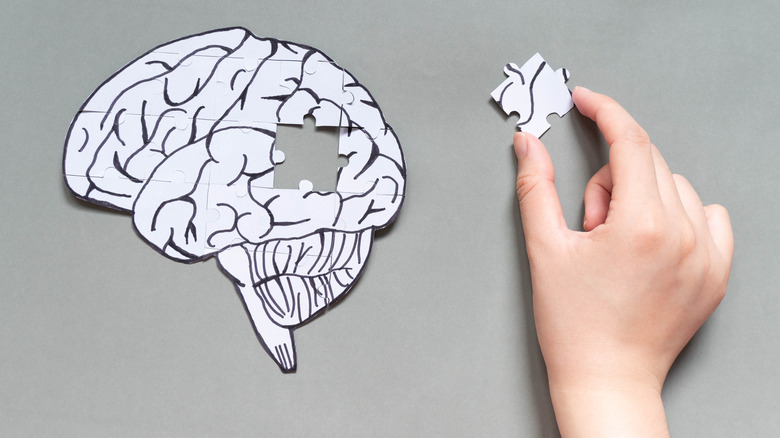Study Reveals Important Link Between Folate Levels And Dementia
Researchers have long been studying what factors influence cognitive decline in older adults. Now, a new study published in the British Medical Journal has researchers exploring the role that folate plays in neurological functioning.
Folate is the water-soluble, natural form of vitamin B9, according to Harvard T.H. Chan School of Public Health. Crucial in the formation of red blood cells, DNA, and new proteins, folate is thought to prevent the early development of certain types of cancers. According to the Centers for Disease Control and Prevention, the daily recommended intake for folate is 400 micrograms; for pregnant individuals, the intake should be between 400 to 1,000 micrograms (per Mayo Clinic). While folate is available in synthetic form as a supplement known as folic acid, nutrient-rich foods such as broccoli, asparagus, beans, peanuts, fresh fruit, and liver are also great sources of folate (via Harvard T.H. Chan School of Public Health).
So we know folate is key for healthy cell function, but what about its influence on cognitive health?
How folate affects cognitive functioning
In a 2022 study conducted by researchers in the U.S. and Israel, scientists examined patient electronic health records pulled from Meuhedet Healthcare Services, the third-largest health maintenance organization in Israel, serving over 1 million patients across the country (per Meuhedet).
Over 27,000 older adults between the ages of 60 to 75 were evaluated, none of which had any pre-existing diagnosis of dementia within the last decade (via British Medical Journal). When measuring patient folate levels, 12.57% of individuals were found to be folate deficient. As researchers followed up with patients over a period of 58 months, prevalence rates of dementia for patients who were folate deficient stood at 3.4%, versus 3.2% in those deemed to have sufficient folate levels, according to Medical News Today. When assessing for all-cause death, rates were nearly twice as high for folate-deficient patients than those without the deficiency. Overall, researchers concluded that those with folate deficiencies are nearly 68% more likely to be diagnosed with dementia.
However, researchers acknowledged that further research is still needed across larger sample sizes (per Medical News Today). In addition, further study findings indicated the possibility that low folate levels could be a symptom of the onset of dementia as opposed to the cause. Nevertheless, the study shows potential for physicians to use folate levels as a contributing factor when determining dementia risk in patients.


